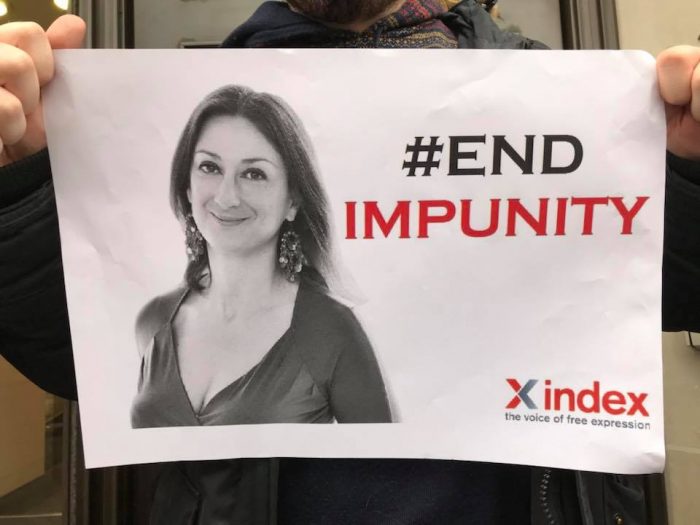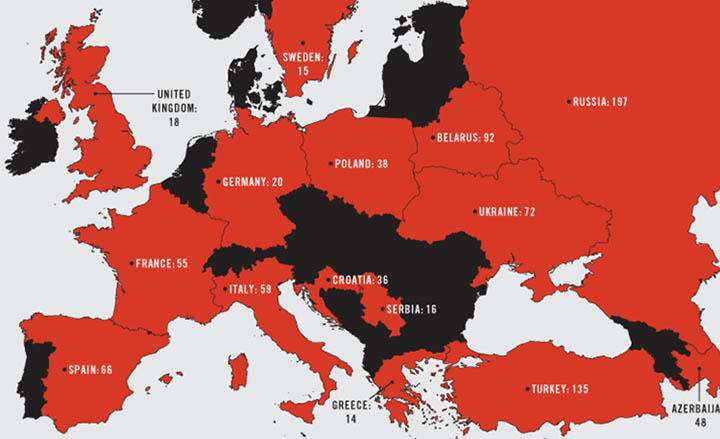16 Apr 2018 | Press Releases
[vc_row][vc_column][vc_column_text] Marking the six month anniversary of the assassination of investigative journalist Daphne Caruana Galizia, who had numerous vexatious lawsuits against her at the time of her murder, Index on Censorship has launched a campaign to raise awareness about the use of legal threats to silence journalists and activists
Marking the six month anniversary of the assassination of investigative journalist Daphne Caruana Galizia, who had numerous vexatious lawsuits against her at the time of her murder, Index on Censorship has launched a campaign to raise awareness about the use of legal threats to silence journalists and activists
Around the world, big business and corrupt politicians are using threats of legal action to silence journalists and other critics — including NGOs and activists.
Usually this starts with a letter threatening expensive proceedings unless online articles are rewritten or removed altogether, and demanding an agreement not to publish anything similar in the future. The letters often tell the recipient that they cannot even report the fact that they have received the letter.
This process is known as a SLAPP (Strategic Lawsuit Against Public Participation). SLAPPs are designed to intimidate and silence critics by burdening defendants with huge legal costs. The purpose of SLAPPs is not to win the case. They are vexatious and are designed to eat up time and resources. They are a way to harass and intimidate journalists and others and dissuade them from reporting.
SLAPP suits are a particular problem for independent media outlets and other small organisations. They are financially draining and can take years to process. Faced with the threat of a lengthy litigation battle and expensive legal fees, many who receive SLAPPs are simply forced into silence.
Index CEO Jodie Ginsberg said: “We believe that by encouraging journalists and media outlets to talk more openly about these threats, we can begin to put an end to the use of these vexatious lawsuits that threaten democracy.”
Today, Index has published a four-step fact sheet for journalists and organisations that aims to educate them about the steps they can take to protect themselves from this type of threat.
More information about the campaign can be found here.
For more information, please contact Sean Gallagher at [email protected][/vc_column_text][/vc_column][/vc_row][vc_row][vc_column][vc_basic_grid post_type=”post” max_items=”12″ style=”load-more” items_per_page=”4″ element_width=”6″ grid_id=”vc_gid:1523883932080-5dce41f2-226c-8″ taxonomies=”5692″][/vc_column][/vc_row]
16 Apr 2018 | Campaigns -- Featured, Media Freedom, media freedom featured, Statements
[vc_row][vc_column][vc_column_text]

Daphne Caruana Galizia, the Maltese investigative journalist who was assassinated in October 2017, had numerous lawsuits pending at the time of her murder.
Around the world, big business and corrupt politicians are using threats of legal action to silence journalists and other critics — including NGOs and activists.
Usually this starts with a letter threatening expensive proceedings unless online articles are rewritten or removed altogether, and demanding an agreement not to publish anything similar in the future. The letters often tell the recipient that they cannot even report the fact that they have received the letter.
This process is known as a SLAPP (Strategic Lawsuit Against Public Participation). SLAPPs are designed to intimidate and silence critics by burdening defendants with huge legal costs. The purpose of SLAPPs is not to win the case. They are vexatious and are designed to eat up time and resources. They are a way to harass and intimidate journalists and others and dissuade them from reporting.
SLAPP suits are a particular problem for independent media outlets and other small organisations. They are financially draining and can take years to process. Faced with the threat of a lengthy litigation battle and expensive legal fees, many who receive SLAPPs are simply forced into silence.
Don’t let them silence you
Index believes that by encouraging journalists and media outlets to talk more openly about these threats, we can begin to put an end to the use of these vexatious lawsuits that threaten democracy.
We support an initiative by members of the European Parliament for a new directive to tackle SLAPPs.
We also know that getting such changes takes time. But it can be done. In the United States, 34 states have enacted laws to combat SLAPPs. California, which adopted its anti-SLAPP legislation in 2009, enables defendants to sue the original plaintiff for malicious prosecution or abuse of process.
In 2015 Canada passed the Protection of Public Participation Act, which aimed to implement a fast-track review process to identify and end vexatious lawsuits.
In the meantime, there are some steps that all journalists can take to help put an end to this practice.
1. Know you are not alone
Journalists from Albania to Japan have received such letters. In Malta, for example, The Shift News website received a letter late last year from law firm Henley and Partners demanding an article be removed. Henley and Partners also stated that the letter was not to be made public.
Daphne Caruana Galizia, the Maltese investigative journalist who was assassinated in October 2017, had numerous lawsuits pending at the time of her murder. She was being sued by Pilatus Bank, a Maltese-based financial institution she frequently criticised. The lawsuit was filed in the USA and dropped following the killing.
Other Maltese media groups, faced with legal threats, have complied with Pilatus Bank’s requests, and deleted and amended articles in their online archives. Pilatus denies any wrongdoing.
In the UK, Appleby, the firm associated with the Paradise Papers, is threatening legal action against the Guardian and the BBC, demanding they disclose any of the six million Appleby documents that informed their reporting and seeking damages for the disclosure of what it says are confidential legal documents.
2. Tell others if you receive a letter
Speak to someone you trust. This could be a colleague at your place of work, your local union or a representative from a nonprofit organisation working in your country or region. Nonprofit organisations and others working in the field of journalist safety include:
Article 19
Committee to Protect Journalists
European Centre for Press and Media Freedom
European Federation of Journalists
International Press Institute
Index on Censorship
Reporters Without Borders
SEEMO
A major fear when receiving a SLAPP letter from a large law firm can be a sinking feeling that you might indeed have something wrong with your story. This casts a long shadow of self-doubt and can prevent journalists even from discussing the letters with each other within the same newsroom.
If you receive these legal threats, discuss them with journalists from other publications who are working on similar stories. This is often the only way to find out that the subject of your investigations is trying to shut down the public discussion systematically. “Discovering that pattern is not only a story in itself, but critically important in helping journalists work together to defend themselves,” says investigative reporter Matthew Caruana Galizia.
3. Report it
If you work in one of the countries covered by the project, you should report such threats to the Index on Censorship Mapping Media Freedom platform, which documents threats to media freedom. Index works with other organisations to raise the worst cases with the Council of Europe so that the council can raise cases directly with the governments concerned.
When you document these threats on Mapping Media Freedom, you help to show that they exist and are a problem for journalists and the public, who are robbed of their right to know. Once we have that documentary evidence, we can push harder for a change in legislation. We believe that the number of threats would speak for themselves, if everyone in the countries we cover reported them.
4. Know your rights
Get expert legal advice but remember that not all lawyers are the same. There are lawyers who are experienced in dealing with SLAPPs. For example, the European Centre for Press and Media Freedom has a legal team that can advise on SLAPP lawsuits and Doughty Street Chambers has an International Media Defence Panel who regularly assist journalists and NGOs faced with these kinds of threats.
Have you received a SLAPP letter? Let us know. Spreading the word about this cases is important in tackling the problem. The more we can document the extent of this issue, the easier it will be to address it. Please let us know by contacting Joy Hyvarinen, Head of Advocacy, at [email protected]. [/vc_column_text][/vc_column][/vc_row][vc_row][vc_column][vc_basic_grid post_type=”post” max_items=”12″ style=”load-more” items_per_page=”4″ element_width=”6″ grid_id=”vc_gid:1523875014232-cb75410f-355e-4″ taxonomies=”8996″][/vc_column][/vc_row]
5 Apr 2018 | Events
[vc_row][vc_column][vc_single_image image=”99371″ img_size=”full” alignment=”center” onclick=”custom_link” link=”https://www.hayfestival.com/m-127-hay-festival-2018.aspx?skinid=1¤cysetting=GBP&localesetting=en-GB&resetfilters=true”][vc_column_text]
CAMBRIDGE SERIES 4: DIGITAL FAKERY AND ITS CONSEQUENCES
Saturday 26 May 2018, 1pm Venue: Good Energy Stage
Tickets: £7 from the Hay Festival
Drawing on her research about human rights reporting in the digital age, the Co-Director of the Centre of Governance and Human Rights at the University of Cambridge argues that digital fakery’s consequences for democracy arise not because we are duped, but because of what we do to not be duped. Chaired by Rachael Jolley, editor of Index on Censorship.
Ella McPherson, Rachael Jolley[/vc_column_text][vc_row_inner][vc_column_inner width=”1/3″][vc_single_image image=”90098″ add_caption=”yes” alignment=”center”][/vc_column_inner][vc_column_inner width=”1/3″][vc_single_image image=”99366″ add_caption=”yes” alignment=”center”][/vc_column_inner][vc_column_inner width=”1/3″][/vc_column_inner][/vc_row_inner][vc_column_text]
THE DEATH OF DAPHNE CARUANA GALIZIA AND THE TRUTH ABOUT MALTA
Monday 28 May 2018, 10am Venue: Starlight Stage
Tickets: £8 from the Hay Festival
The journalist Daphne Caruana Galizia investigated corruption in the Maltese government for decades in the face of intimidation, libel threats and persecution. She was assassinated in a car bomb attack on 16 October 2017. The editor of Index on Censorship is joined by Daphne’s son Paul and her fellow Maltese journalist Caroline Muscat of The Shift News. They talk to the BBC’s Europe Editor.
Rachael Jolley, Paul Caruana Galizia, Caroline Muscat with Katya Adler[/vc_column_text][vc_row_inner][vc_column_inner width=”1/3″][vc_single_image image=”90098″ add_caption=”yes” alignment=”center”][/vc_column_inner][vc_column_inner width=”1/3″][vc_single_image image=”99367″ add_caption=”yes” alignment=”center”][/vc_column_inner][vc_column_inner width=”1/3″][vc_single_image image=”99368″ add_caption=”yes” alignment=”center”][/vc_column_inner][/vc_row_inner][vc_row_inner][vc_column_inner width=”1/3″][vc_single_image image=”99369″ add_caption=”yes” alignment=”center”][/vc_column_inner][vc_column_inner width=”1/3″][/vc_column_inner][vc_column_inner width=”1/3″][/vc_column_inner][/vc_row_inner][/vc_column][/vc_row]
29 Mar 2018 | Campaigns -- Featured, Europe and Central Asia, Press Releases, United Kingdom
[vc_row][vc_column][vc_column_text]
A Scottish politician lodged a motion in the Scottish Parliament on 27 March on media freedom following Index on Censorship’s annual Mapping Media Freedom report, crediting its authors for “their continued endeavours to defend media freedom and protect journalists”.
Mapping Media Freedom, Index on Censorship’s project monitoring threats to media freedom in 42 European and neighbouring countries, recorded 1,089 violations in 2017. As the motion notes, a majority of these threats came from official or governmental bodies.
The motion, put forward by Andy Wightman MSP of the Scottish Greens, “deeply regrets” the loss of life of those journalists murdered throughout Europe in 2017 while conducting their duties: Maltese journalist, Daphne Caruana Galizia; Swedish freelancer, Kim Wall; Syrian investigative mother and daughter team based in Turkey, Orouba and Halla Barakat; and three Russian journalists, Nikolai Andrushchenko, Yevgeny Khamaganov and Dmitri Popkov.
The motion “condemns what it sees as the day-to-day challenges facing journalists who are seeking to hold power to account”, notes some of the most worrying trends throughout the year, including the assault of 178 journalists and the 367 instances of psychological abuse of journalists, and criticises the “deliberate silencing of people and organisations by economic, political or criminal interests” through civil litigation and other legal measures.
The motion received cross-party support from Scottish Green MSPs Ross Greer, Patrick Harvie and Mark Ruskell, SNP MSPs Kenneth Gibson and Mairi Gougeon, and Labour MSP Pauline McNeill.
“We are pleased that Mr Wightman has brought the important issue of media freedom to the Scottish Parliament,” said Index on Censorship chief executive Jodie Ginsberg. “Index is deeply concerned by the growing trend of threats to the media in the region and it is important politicians do their utmost to protect this fundamental pillar of democracy.”
You can read the full report, authored by Index on Censorship’s assistant online editor Ryan McChrystal, here.[/vc_column_text][/vc_column][/vc_row][vc_row][vc_column][vc_basic_grid post_type=”post” max_items=”4″ element_width=”6″ grid_id=”vc_gid:1522314174440-fa9adb32-fe93-2″ taxonomies=”6564″][/vc_column][/vc_row]
 Marking the six month anniversary of the assassination of investigative journalist Daphne Caruana Galizia, who had numerous vexatious lawsuits against her at the time of her murder, Index on Censorship has launched a campaign to raise awareness about the use of legal threats to silence journalists and activists
Marking the six month anniversary of the assassination of investigative journalist Daphne Caruana Galizia, who had numerous vexatious lawsuits against her at the time of her murder, Index on Censorship has launched a campaign to raise awareness about the use of legal threats to silence journalists and activists

